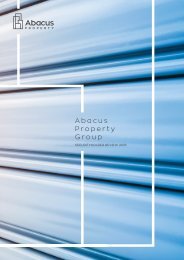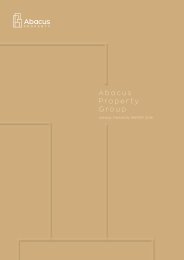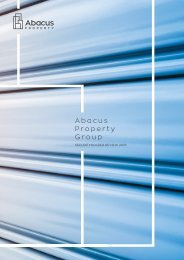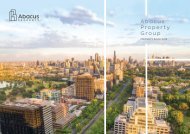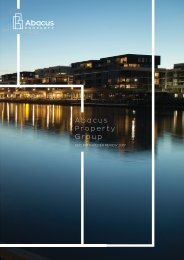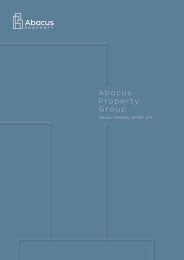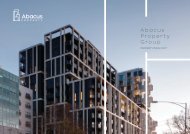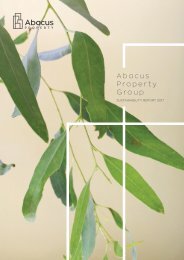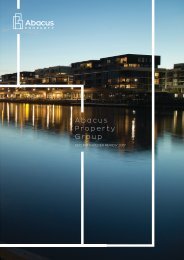Abacus Property Group – Sustainablity Report 2018
Abacus Property Group – Sustainablity Report 2018
Abacus Property Group – Sustainablity Report 2018
Create successful ePaper yourself
Turn your PDF publications into a flip-book with our unique Google optimized e-Paper software.
26—27<br />
Responsible<br />
resource<br />
management<br />
Why is this important?<br />
As the owner of a diversified<br />
property investment portfolio<br />
of office, self storage, industrial<br />
and retail properties as well<br />
as a property developer, we<br />
acknowledge the built environment<br />
impacts on Australia’s emissions<br />
and wider resource consumption<br />
profile. We recognise that we are<br />
well positioned to positively impact<br />
the resource consumption of our<br />
buildings through efficient property<br />
management and development<br />
and upgrade of buildings which<br />
incorporate more efficient plant<br />
and equipment. We recognise that<br />
responsible management of our<br />
buildings will contribute to capital<br />
appreciation of those buildings<br />
over time.<br />
In addition to energy and water<br />
consumption, we understand that<br />
waste management is a key issue<br />
identified by our stakeholders. We<br />
acknowledge that the development<br />
and operation of buildings produces<br />
waste, which we can manage to<br />
minimise negative impacts. We<br />
have implemented organic recycling<br />
solutions at a number of our retail<br />
centres and we will work towards<br />
collating and disclosing waste data<br />
in future reporting periods with a key<br />
focus being diversion from landfill.<br />
Our approach to<br />
managing<br />
When we invest in properties we<br />
seek to balance the short term and<br />
long term interest of our building<br />
strategies. Typically, when a property<br />
is acquired a full assessment of the<br />
property is completed that may<br />
entail both functional upgrades and<br />
cosmetic changes. A key way in<br />
which we manage this is monitoring<br />
energy and water consumption<br />
data across all properties for which<br />
we have operational control. This<br />
process enables us to determine<br />
whether we are exceeding the<br />
reportable facility and corporate<br />
group thresholds under the NGER<br />
Act. We note that in the current<br />
year, consistent with prior years, we<br />
have not exceeded the reportable<br />
NGER thresholds. This process<br />
allows us to assess consumption<br />
of our properties and plan for future<br />
upgrade of mechanical services<br />
before lifecycle replacement<br />
(including control systems, air<br />
conditioning chillers, boilers, pumps<br />
and cooling towers), which in turn<br />
improve environmental and financial<br />
outcomes of our assets.<br />
Our self-storage business unit is<br />
a low impact industry that actively<br />
looks to gain efficiencies through<br />
harnessing energy efficient fixtures<br />
and fittings, augmented with the<br />
application of smart technology<br />
to leverage capability and reduce<br />
energy impact. <strong>Abacus</strong> has typically<br />
retained existing fluorescent lighting<br />
fittings, but upgraded their efficiency<br />
by retrofitting LED lighting tubes,<br />
resulting in less power consumption<br />
but providing the same lighting<br />
capacity. All new facilities have been<br />
fitted with IR sensor technology to<br />
minimise light wastage.<br />
In FY18, we have continued<br />
to make progress on reducing<br />
our greenhouse gas emissions,<br />
energy consumption and water<br />
consumption. Compared to our<br />
FY16 baseline, we have recorded<br />
a 25% decrease in total energy<br />
consumption and 26% decrease in<br />
total scope 1 and scope 2 emissions<br />
across our commercial properties.<br />
Whilst we have sold and acquired<br />
properties in the past two years, key<br />
drivers for these reductions include<br />
increased investment in LED lighting<br />
to reduce energy consumption and<br />
investment in tailored upgrades to<br />
improve energy efficiency.<br />
Responsible Resource Management Highlights<br />
FY18 FY17 FY16<br />
Energy consumption (GJ) 118,519 139,392 158,805<br />
Scope 1 and Scope 2 emissions (tCO2-e) 21,240 26,297 28,634<br />
Water consumption (kL) 218,643 244,475 261,298



